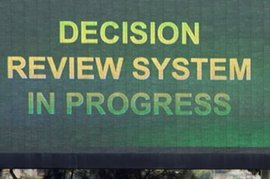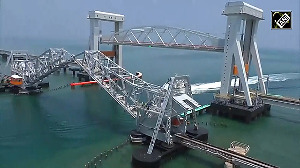Abandoning its rigid stand on technology, but acting on its own terms, the Board of Control for Cricket in India on Monday agreed to the mandatory use of the controversial Decision Review System in a modified version in all international matches, at the ongoing ICC Annual Conference.
The modified version, which was unanimously approved by the ICC's chief executives' committee on the second day of the conference, will have Hot-Spot technology but without the Hawk Eye ball-tracker, which means that LBW decisions will not be within the purview of the DRS.
The mandatory terms and conditions for the DRS that have now been recommended by the ICC's CEC to the Executive Board for approval on Tuesday will now consist of "thermal imaging" and "sound technology". It has been agreed to remove the "ball tracker" from the ICC's original compulsory list of DRS technologies.
 Hot Spot, the 'thermal imaging' technology now available and made mandatory in the DRS, will mostly be used for close catches and edges.
Hot Spot, the 'thermal imaging' technology now available and made mandatory in the DRS, will mostly be used for close catches and edges.
"The CEC today unanimously recommended universal standards for the usage of technology in decision-making (Decision Review System) in all Test matches and ODIs subject to availability and commercial considerations. The agreed standards will include infra-red cameras and audio-tracking devices," the ICC said in a statement.
The BCCI said it has agreed to the modified DRS which will have Hot-Spot but without the ball tracker. It said the ICC CEC has agreed that the use of 'ball-tracker' technology in bilateral series be left to the two Boards.
"The BCCI is agreeable to the use of technology in decision-making, which will include infra-red cameras and audio-tracking devices," BCCI secretary and president-elect N Srinivasan said in a statement.
"The BCCI has always expressed its willingness to embrace technology, for the betterment of the game. However, the current ball-tracking technology, on which the DRS system is based, is not acceptable to the Board. This position has not changed," the statement added.
"The BCCI's view was supported at the ongoing ICC CEC meeting in Hong Kong. The CEC also decided that the continued use of the ball-tracking technology as a decision-making aid, will depend on the bilateral arrangement between the participating teams," it said.
The ICC also said that the use of ball-tracking technology in a bilateral series will depend on agreement between member Boards.
"The CEC also agreed that further independent and expert research will be carried out into ball-tracking technology and its accuracy and reliability. The continued use of ball-tracking technology as a decision-making aid will depend on bilateral agreement between the participating Members," the statement said.
"The CEC, which also approved the Cricket Committee's recommendation to reduce the number of unsuccessful reviews in ODIs from two to one, believed that this was a step forward as the game embraces the principles of technology."
Monday's decision means that India will, for the first time since 2008, be agreeable to using the DRS, though in a modified form, in a bilateral series when it tours England next month.
However, the DRS to be used in the England-India series will be without the Hawk-Eye ball-tracker and therefore not include leg before decisions.
The BCCI had opposed the DRS on the ground that it is not 100 per cent accurate. Senior batsman Sachin Tendulkar had said that DRS will be more acceptable if it has Hot-Spot technology.











 © 2025
© 2025